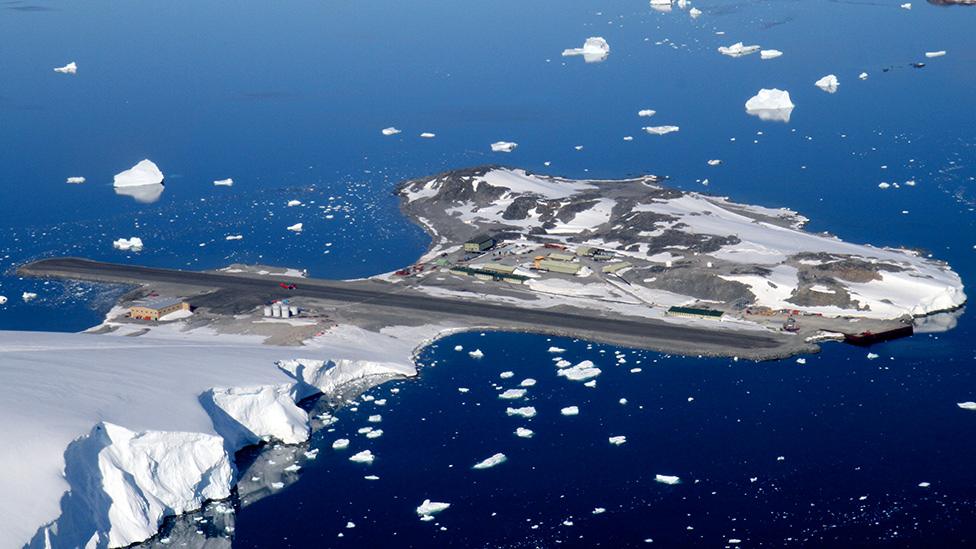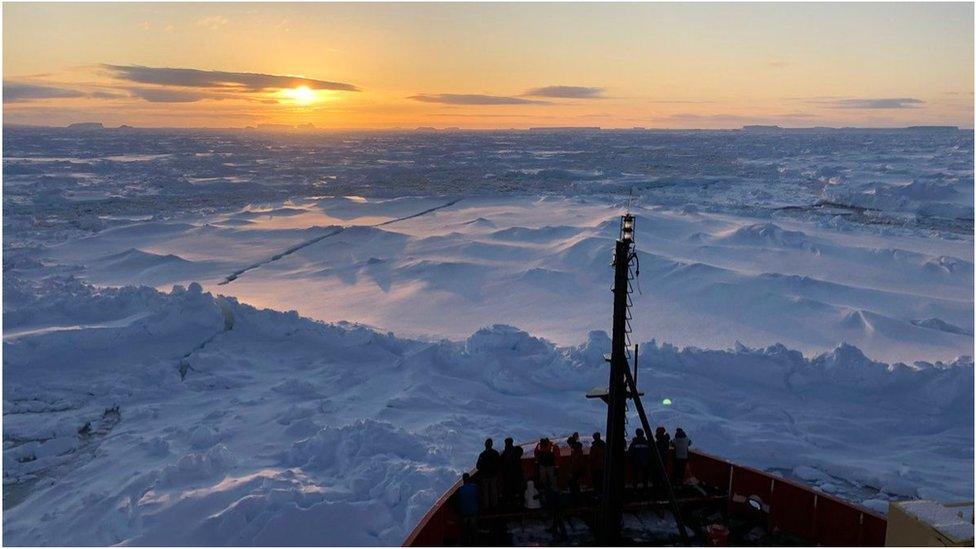Coronavirus complicates journeys home from Antarctica
- Published

The UK's Rothera research station has a large group of construction workers who need to get home
The British Antarctic Survey (BAS) says it can now bring home all of its staff that need to leave the White Continent.
At the end of the Southern Hemisphere summer, everyone except a core team is extracted - but that procedure has been complicated this year by Covid-19.
Some of the usual routes - such as through Chile via ship or aeroplane - have been closed because of lockdowns.
BAS people are being ferried to the Falkland Islands with the intention of flying them on to the UK with the RAF.
This will take some time, however, so the research agency is also now chartering a cruise ship in Port Stanley to act as temporary accommodation.
The vessel, Hebridean Sky, will additionally act as somewhere to isolate the scientists and other staff as they move up from the Antarctic - for their benefit and that of the Falklanders. The islands had their first confirmed case of Covid-19 last week.
Thirty BAS personnel flew into Britain late on Sunday night using the "airbridge" route. The length of the journey from the South Atlantic meant their plane had to be refuelled in Senegal in West Africa.
Normally, this would be done on Ascension Island or Cape Verde, but both territories have been closed recently for stop-offs - the former because its runway is being serviced. Just one more complicating factor.
"The situation has been changing every day. You think you've got something in place to bring everyone home and then something happens," said BAS director Prof Jane Francis.
"But that's the kind of the thing that we have to deal with. We have to be completely adaptable because working in Antarctica is like that - conditions change, the weather changes. So, we have to be ready for it," she told BBC News.

A UK-US research team was working on a ship off West Antarctica when the pandemic was declared
All the scientists and field guides who have been working in remote locations on the continent have been collected up and transferred to the main research station at Rothera on the western side of the Antarctic Peninsula.
As of Monday, the base still had some 90 individuals who needed to be brought home to Britain.
These are mostly construction workers who've been building a wharf for the RRS Sir David Attenborough, the UK's new £200m ice-breaker due to enter service later this year.
The 90 are likely to make the hop to the Falklands on Britain's existing ice-breaker, the RRS James Clark Ross, which is currently unloading supplies at Rothera to sustain the core team that will over-winter as usual.
The really big headache for BAS and other nations' Antarctic science agencies is how to keep coronavirus out of the continent.
"We're working very hard to do that," said Prof Francis. "We're trying to make sure that anybody that goes to Antarctica is virus free. So, they've either not been anywhere where there's been the virus or they've been in isolation. But that will be our challenge for the forthcoming season, I think."
Scientists would normally start going back en masse in about November, but it's possible their research projects will have to be scaled back in scope or even delayed by a year, depending on how long pandemic conditions last.
Dr Robert Larter was one of the BAS scientists who flew into the UK on Sunday. He was co-leading a British-American expedition in a ship off West Antarctica's huge Thwaites Glacier when the Covid-19 crisis went global.
"It [was] strange watching from the isolated environment of a research vessel as the coronavirus situation developed," he said.
"I think we remained fairly well informed. Although our internet connection was very limited it was sufficient to be able to read online news reports, and we were also able to make phone calls to family and friends using an Iridium (satellite) phone on board.
"So, on an intellectual level we knew what was going on. We were completely detached from the evolving situation, however, and the reality of the way the world we would return to was changing took a while to sink in," he told BBC News.

A SIMPLE GUIDE: How do I protect myself?
AVOIDING CONTACT: The rules on self-isolation and exercise
LOOK-UP TOOL: Check cases in your area
MAPS AND CHARTS: Visual guide to the outbreak
VIDEO: The 20-second hand wash
